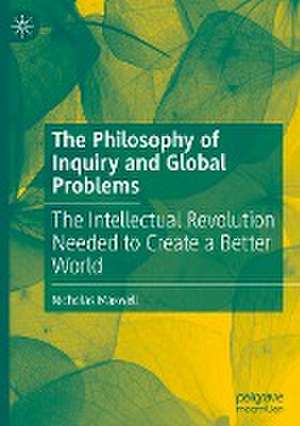The Philosophy of Inquiry and Global Problems: The Intellectual Revolution Needed to Create a Better World
Autor Nicholas Maxwellen Limba Engleză Hardback – 31 ian 2024
Preț: 718.96 lei
Preț vechi: 876.78 lei
-18% Nou
Puncte Express: 1078
Preț estimativ în valută:
137.64€ • 141.55$ • 114.18£
137.64€ • 141.55$ • 114.18£
Carte tipărită la comandă
Livrare economică 19 februarie-05 martie
Preluare comenzi: 021 569.72.76
Specificații
ISBN-13: 9783031494901
ISBN-10: 3031494903
Pagini: 313
Ilustrații: XIX, 313 p. 5 illus.
Dimensiuni: 148 x 210 mm
Greutate: 0.55 kg
Ediția:1st ed. 2024
Editura: Springer Nature Switzerland
Colecția Palgrave Macmillan
Locul publicării:Cham, Switzerland
ISBN-10: 3031494903
Pagini: 313
Ilustrații: XIX, 313 p. 5 illus.
Dimensiuni: 148 x 210 mm
Greutate: 0.55 kg
Ediția:1st ed. 2024
Editura: Springer Nature Switzerland
Colecția Palgrave Macmillan
Locul publicării:Cham, Switzerland
Cuprins
1. Bad Philosophy, the Climate Crisis, and other Global Problems.- 2. Bad Academic Philosophy Responsible for Global Problems.- 3. The Post-Cartesian Blunder, and The Failure to Develop Philosophy as Critical Fundamentalism.- 4. The Post-Newtonian Blunder, and The Failure to Develop Aim-Oriented Empiricism.- 5. The Post-Enlightenment Blunder, and the Failure to Develop Academic Inquiry so as to Become Rationally Devoted to Helping Humanity Create a Civilized World.- 6. What We Need to Do.- 7. Appendix 1 How to Solve Hume’s Problem of Induction.- 8. Appendix 2 How Aim-Oriented Empiricism Would Benefit Science.
Notă biografică
Nicholas Maxwell is Emeritus Reader at University College London. He has devoted much of his working life to arguing we need to bring about a revolution in academia so that it comes to seek and promote wisdom and does not just acquire and apply knowledge. He has published fifteen books on this theme.
Textul de pe ultima copertă
Universities have long been dominated by a philosophy of inquiry that may be called knowledge-inquiry. This holds that, in order to do justice to the basic humanitarian aim of helping to promote human welfare, academic inquiry must, in the first instance, seek knowledge and technological know-how. First, knowledge is to be acquired; once acquired, it can be applied to help promote human welfare. But this philosophy of knowledge-inquiry is an intellectual and humanitarian disaster. It violates three of the four most elementary rules of rational problem solving conceivable, and as a result fails to give priority to the task of helping humanity resolve those conflicts and problems of living, such as the climate and nature crises, that need to be resolved if we are to make progress to a better world – a world in which there is peace, democracy, justice, liberty, and sustainable prosperity, for all. Very few academics today are aware of this rationalityscandal. We urgently need to bring about a revolution in universities around the world, wherever possible, so that academic inquiry puts all four rules of rational problem solving into practice, and becomes rationally devoted to helping humanity learn how to make progress towards a better world. Knowledge-inquiry needs to become wisdom-inquiry, rationally devoted to helping humanity create a wiser world.
Nicholas Maxwell is Emeritus Reader at University College London. He has devoted much of his working life to arguing we need to bring about a revolution in academia so that it comes to seek and promote wisdom and does not just acquire and apply knowledge. He has published fifteen books on this theme.
Caracteristici
Suggests that a revolution in the universities is needed to help humanity create a genuinely civilized world Argues for a new kind of science that improves its aims and methods as it proceeds Shows that philosophy has a vital role to play in helping humanity deal successfully with the climate and nature crises
